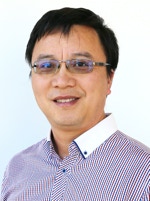| Biography | |
|---|---|
 Prof. Yun Wang University of California, USA |
|
| Title: Design and Optimization of PEM Fuel Cell: Deep Learning from Multi-physics Simulation | |
| Abstract: Polymer electrolyte membrane (PEM) fuel cell has been regarded as a potential power source for various applications due to its noteworthy features of high efficiency and zero emission [1-5]. Its performance and dynamics are controlled by electrochemically coupled transport processes, including fluid flow, phase change, species transport, energy conservation, and proton/electron conduction, and are important to its practical applications. Artificial neural network (ANN), inspired by the biological neural networks that constitute animal brains, provides logical connection between input and output variables to predict output values according to given input variables. It has been successfully applied to many power and energy systems to optimize component materials, dynamic control, and system design [2,4,6]. Genetic algorithm (GA) is a heuristic selection algorithm inspired by Darwin’s law of natural survival. It is efficient for optimization problems with advantages including not trapping to local minima, in which other conventional search methods may fail without proper treatment. In this talk, I will present several fundamental aspects regarding physical phenomena in PEM fuel cell, including porous media flow field, maximum power output, and fuel cell design, and discuss recent ANNGA approaches [2,6] for porous media flow field optimization and online control to advance PEM fuel cell technology and applications. References: 1. Y. Wang, K. S. Chen, J. Mishler, S. C. Cho, X. C. Adroher, A Review of Polymer Electrolyte Membrane Fuel Cells: Technology, Applications, and Needs on Fundamental Research, Applied Energy 88 (2011) 981-1007. 2. Y Wang, B Seo, B Wang, N Zamel, K Jiao, and XC Adroher, Fundamentals, Materials, and Machine Learning of Polymer Electrolyte Membrane Fuel Cell Technology, Energy and AI, (2020) 100014. 3. Song, G. H., & Meng, H. (2013). Numerical modeling and simulation of PEM fuel cells: Progress and perspective. Acta Mechanica Sinica, 29(3), 318-334. 4. de Oliveira, M. C. L., Ett, G., & Antunes, R. A. (2012). Materials selection for bipolar plates for polymer electrolyte membrane fuel cells using the Ashby approach. Journal of power sources, 206, 3-13. 5. Verma, A., & Pitchumani, R. (2014). Effects of operating parameters on the transient response of proton exchange membrane fuel cells subject to load changes. International journal of hydrogen energy, 39(33), 19024-19038. 6. Zhang, G., Wu, L., Jiao, K., Tian, P., Wang, B., Wang, Y., & Liu, Z. (2020). Optimization of porous media flow field for proton exchange membrane fuel cell using a data-driven surrogate model. Energy Conversion and Management, 226, 113513. | |
| Biography: Research Interests: Complex Multi-phase Flow, Advanced Hydrogen Storage, High Power Fuel Cells, New Batteries, Efficient Cooling, Microscale 2-Phase Flow, Droplet Dynamics, Novel Heat Pipes, High-resolution Neutron/Optical Imaging, New Materials, Renewable Energy, Advanced Fabrication, MD, Machine Learning. Education: Ph.D Mechanical Engineering, Penn State University, 2006 M.S. Mechanical and Engineering Science, Peking University, 2001 B.S. Mechanical and Engineering Science, Peking University, 1998 | |
